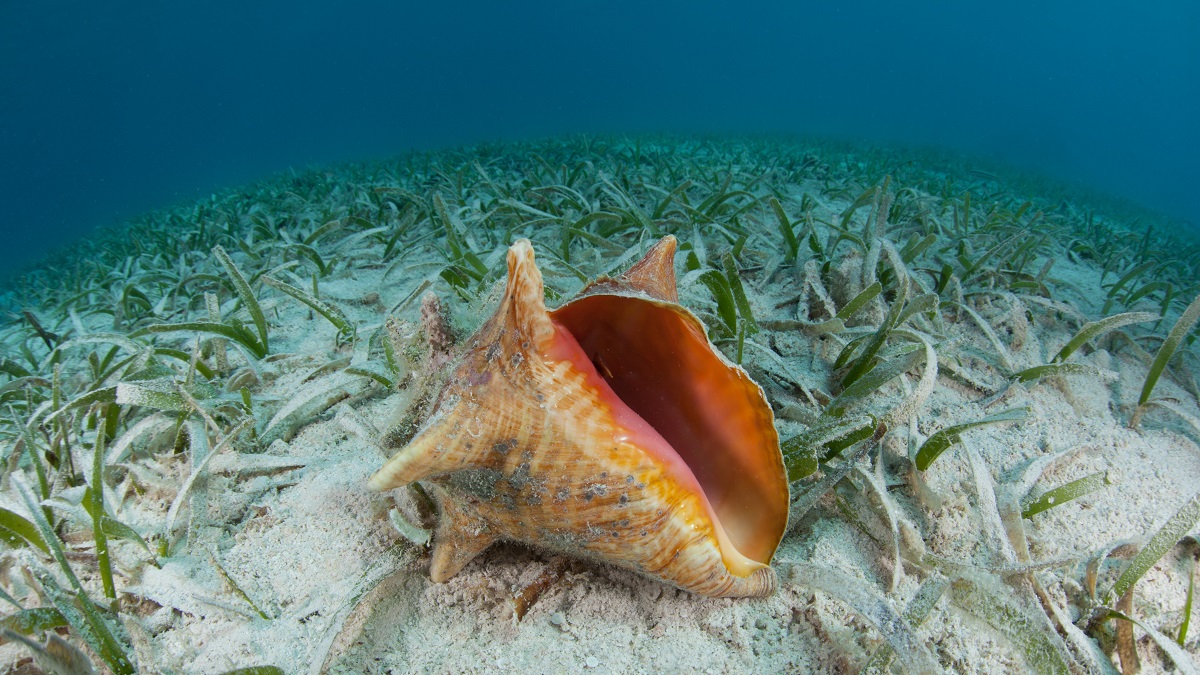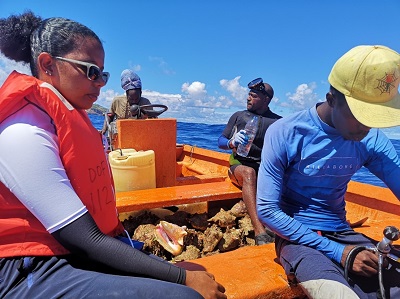Countries aim to protect the iconic queen conch, build a sustainable ocean economy and provide tangible benefits to people working in the region’s seafood value chains.

© Shutterstock/Ethan Daniels | A queen conch lies on a seagrass bed in the Caribbean Sea.
Eastern Caribbean island nations Grenada, Saint Lucia, and Saint Vincent and the Grenadines have committed to a regional Blue BioTrade action plan to sustainably harvest and trade queen conch.
The large sea snail is one of the Caribbean’s most iconic and valuable fishery resources, generating significant export revenues for Eastern Caribbean countries.
The global market for queen conch, estimated at more than $74 million, is growing annually, making the species an increasing victim of illegal fishing and overfishing. It’s also increasingly vulnerable to the effects of climate change, including increases in water temperatures in the Caribbean Sea.
“Blue BioTrade is an approach to commercialize marine biodiversity products or services in a way that respects people, nature and legal frameworks,” said David Vivas, an UNCTAD legal officer working on ocean economy issues.
Applying BioTrade principles to marine conservation
The plan applies UNCTAD’s seven BioTrade Principles to the conservation of marine resources.
It was adopted at a regional workshop organized on 26 and 27 May by UNCTAD, the Organisation of Eastern Caribbean States (OECS) and the Convention on International Trade in Endangered Species of Wild Fauna and Flora (CITES).
The workshop, funded by the European Commission, brought together fishers, conch processors and distributors, NGO representatives, government officials from departments of fisheries and policy advisors from the UN and OECS.
“Our maritime space is almost 85 times larger than our collective landmass,” said Didacus Jules, Director General of OECS.
This is an indicator of the huge potential of the ocean economy, which requires a sustainable approach in the face of climate change, Mr. Jules said.
Protecting the beloved sea snail
Under the plan, the three countries will conduct stock assessments to understand the health of queen conch in the Caribbean and create a nursery to replenish the species’ wild populations.
Based on the stock assessments, they will consider quotas and closed seasons to preserve the beloved sea snail.
They will also create an export task force to facilitate access to high-value markets, such as Martinique and other islands in the French Caribbean, and to ensure fishers receive a fair share of the value of queen conch.
The countries will train fishers in scuba-diving and offer them better insurance schemes to reduce the health risks associated with deep water diving.
OECS and its member states will continuously liaise with CITES to overcome any existing trade suspensions.
Karen Gaynor, a scientific officer at CITES, said trade suspensions are a last resort, and the organization’s objective is to ensure trade is “legal, sustainable and traceable”.
The plan will be co-managed by fishers and other stakeholders. Local fishers will be registered and prioritized in a licence system to ensure their continued access to their livelihoods.

Project milestone
The workshop was a key result of the first phase of a regional project launched in October 2020.
The project identified recommendations for policymakers, investors and exporters to seize the benefits of sustainable trade of queen conch.
The three beneficiary countries validated the recommendations and committed to implementing them coherently, outlining their priorities.
Host country Saint Vincent and the Grenadines stressed the importance of obtaining certified facilities for food safety to increase the value generated from queen conch.
Saint Lucia emphasized the need for scuba-diving trainings for its fishers to reduce health risks associated with deep-water diving.
Grenada focused on measures to lift CITES trade suspensions, which currently block its exports of queen conch. It has prioritized conducting a stock assessment, followed by legal reforms. The country has avoided a potential new trade suspension thanks to its recent submission of a legislative reform plan to implement CITES.
Regional and sectoral expansion
The project’s second phase will focus on implementing the regional plan in the three countries.
UNCTAD, in collaboration with the International Trade Centre, will provide a free self-assessment tool to help countries and businesses benchmark and meet sustainable trade standards specific to marine food sectors.
The project will expand to benefit other OECS member states and apply Blue BioTrade Principles to new species, such as sargassum and sea moss by-products.



